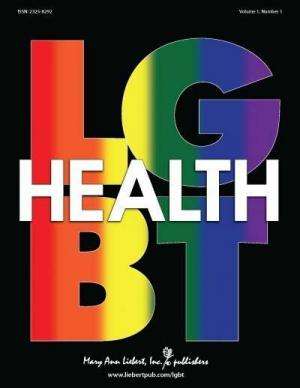LGBT identity data in health records would improve care, reduce disparities

Recording the sexual orientation and gender identity (SOGI) of individuals in their health records would greatly facilitate identifying the unique health needs and health disparities of LGBT individuals, leading to improved quality and outcomes of their health care. The advantages of reporting this information and the growing support for including it in electronic health records (EHRs) are described in an article in LGBT Health, a new peer-reviewed journal from Mary Ann Liebert, Inc., publishers, launching in fall 2013.
Sean Cahill, PhD and Harvey J. Makadon, MD, The Fenway Institute (Boston, MA), emphasize the need for more data and research on LGBT health and health disparities, as noted in a 2011 Institute of Medicine report that recommended routine collection of SOGI information and its inclusion in EHRs. Ready access to this information could facilitate conversations between clinicians and patients about risk factors and targeted preventive measures. Cahill teaches public policy at New York University (New York, NY) and Makadon is Clinical Professor of Medicine at Harvard Medical School (Boston, MA).
In the article "Sexual Orientation and Gender Identity Data Collection in Clinical Settings and in Electronic Health Records: A Key to Ending LGBT Health Disparities" the authors describe overwhelming support for routine collection of SOGI information among LGBT advocacy groups and HIV/AIDS organizations, as well as the support for SOGI data collection in the Healthy People 2020 initiative, and the Obama administration's Affordable Care Act.
"The Obama Administration has taken significant strides toward increasing LGBT data collection on health surveys," said Cahill. "Right now the federal government is considering whether to include SOGI as standard demographic questions in Stage 3 meaningful use guidelines, which set the standard for data collection in EHRs. We believe that including SOGI measures in these guidelines would dramatically increase our understanding of LGBT health disparities and our ability to address them."
"While there is no question about the benefits of collecting such data, some concern has been raised about the security of the EHR and potential misuses," says Editor-in-Chief, William Byne, MD, PhD, Icahn School of Medicine at Mount Sinai, New York, NY. "In addition to addressing how to best elicit the data, Cahill and Makadon also address such implementation concerns."
















